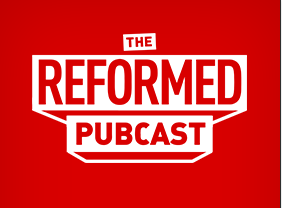Ver. 24. Which things are a typical history; for these two women represent the two covenants, with the churches thereto adhering respectively; the one from Mount Sinai, to wit, the covenant of works, which was given there, and where the Jewish synagogue, . . . Continue reading →
Covenant Theology
Rollock: Covenant Of Works Founded On Nature And Republished To Israel
For this cause he, when he was to repeat that covenant of works to the people of Israel, he gave the first law written in tables of stone; Then he made a covenant with his people, saying,”do these things and ye shall live.” Therefore the ground of the covenant of works was not Christ, nor the grace of God in Christ, but the nature of man in the first creation holy and perfect, endued also with the knowledge of the law. Continue reading →
Our Salvation Is By Grace Alone
And just as it is appointed for man to die once, and after that comes judgment, so Christ, having been offered once to bear the sins of many, will appear a second time, not to deal with sin but to save those who are eagerly waiting for him. Continue reading →
Christ Is Both The Foundation And Fulfillment
As far as I can tell, this perspective has been all but lost in modern biblical studies. But a text like Gal 3:16 was fertile ground for the development in classical Reformed theology for the belief that the covenant of grace was . . . Continue reading →
Johannes Braun: Adam Would Have Merited His Reward
If Adam had remained upright and done everything which God required of him, he would indeed have merited his reward, but not condignly, as if either his own person or his works were equal in value to the reward. For no creature, . . . Continue reading →
Irish Articles (1615): The Covenant Of Law, Christ’s Merits, And Grace To Sinners
21. Man being at the beginning created according to the image of God (which consisted especially in the wisdom of his mind and the true holiness of his free will), had the covenant of law engrafted in his heart, whereby God did . . . Continue reading →
Heidelberg 74: We Are Abraham’s Children
74. Are infants also to be baptized? Yes, for since they belong to the covenant and people of God as well as their parents, and since redemption from sin through the blood of Christ, and the Holy Spirit who works faith, are . . . Continue reading →
On The Reformed Pubcast Discussing Covenant Theology
Covenant theology is sometimes regarded and presented by American evangelicals as an idiosyncratic, mysterious, even esoteric way to read Scripture. Of course, from a historical and biblical perspective, it is nothing of the sort. Much of what the Reformed began to teach . . . Continue reading →
An Important Distinction Between Kinds And Functions Of Conditions
When we use the word “condition,” the first sense that probably comes to mind, in English usage, is the first definition offered by the Oxford English Dictionary: “convention, stipulation, proviso.” There is another sense to the word, however, as it was used . . . Continue reading →
The Abrahamic Covenant Unifies Redemptive History
During our senior year in high school (1978–79) three of us went to lunch. Our public high school had an open campus, meaning that we were permitted to come and go so long as we attended classes. We piled into a friend’s . . . Continue reading →
Witsius On What “I Will Be Your God” Means
That expression, to be God to any, in its full import, includes life eternal, For, when God becomes the sinner’s God, he then becomes to him what he is to himself. But, what is he to himself? Doubtless, the fountain of eternal . . . Continue reading →
Abraham, Moses, And Circumcision
Introduction Since the early to mid-19th century, American evangelical Christianity has been largely dominated by a set of assumptions about the nature of redemptive history and the progress of revelation that may be called Baptistic. Not everyone who holds these assumptions or . . . Continue reading →
Office Hours: The Trinity And The Covenant Of Redemption (Part 1)
There are passages in Scripture such as Psalm 110, Hebrews 7, and John chapter 17 that reflect something of the eternal relationship between the persons of the Trinity and especially between the Father and the Son. In the Reformation some of our . . . Continue reading →
A Curriculum For Those Wrestling Through Covenant Theology And Infant Baptism
Olevianus On The Covenant Of Works
This obedience of the Son was superior to all the justice of the Law. For Adam also, if he willed, could have remained in the righteousness of the Law. And to the degree that the curse was owed for every sin of . . . Continue reading →
Polanus On The Covenant Of Works With Adam And Israel
God’s covenant is a bargain which God hath made with men, in which God promises to men some good, and requires of them again, that they perform those things which he commands. And that covenant is either eternal or temporal. The eternal . . . Continue reading →
The Covenant Of Works In Late-17th Century English Reformed Theology
QUESTION II. What ground we have to speak of “God’s covenant with Adam,” and to call it “a covenant;” there being no mention of it here in the text, nor elsewhere in scripture do we read of “God’s covenant with Adam.” ANSWER. . . . Continue reading →
Office Hours: The Trinity And The Covenant Of Redemption (Part 2)
There are passages in Scripture such as Psalm 110, Hebrews 7, and John chapter 17 that reflect something of the eternal relationship between the persons of the Trinity and especially between the Father and the Son. In the Reformation some of our . . . Continue reading →
With Calvinist Batman On Covenant Theology And Reformed Identity
There are a number of evangelical people who are questioning the broadly evangelical theology, piety, and practice (whether Dispensational or Pentecostal or both) they inherited. For them covenant is a new category and they are working through the implications of the history of redemption . . . Continue reading →
Calvin On The Substance Of The Covenant Of Works
Because what God so severely punished must have been no light sin but a detestable crime, we must consider what kind of sin there was in Adam’s desertion that enkindled God’s fearful vengeance against the whole of mankind. To regard Adam’s sin . . . Continue reading →







